
JOURNAL OF FINANCIAL AND QUANTITATIVE ANALYSIS
Scope & Guideline
Advancing the Frontiers of Financial Research
Introduction
Aims and Scopes
- Quantitative Finance Research:
The journal emphasizes the application of quantitative methods in finance, including statistical analysis, econometrics, and machine learning, to uncover insights about market behavior and financial decision-making. - Corporate Finance and Governance:
A core area of focus is the examination of corporate finance practices, governance structures, and their implications for firm value, investment decisions, and stakeholder outcomes. - Market Microstructure and Trading Behavior:
Research on market microstructure, including trading strategies, market efficiency, and liquidity, is a significant aspect of the journal’s scope, reflecting the complexities of trading in modern financial markets. - Risk Management and Financial Stability:
The journal addresses issues related to risk management, financial regulations, and systemic risk, contributing to the discourse on financial stability and crisis prevention. - Behavioral Finance and Investor Behavior:
Exploration of behavioral finance, including how psychological factors influence investor decisions and market dynamics, is a recurring theme in the journal. - Interdisciplinary Approaches:
The journal encourages interdisciplinary research that integrates insights from economics, sociology, and psychology to enhance the understanding of financial phenomena.
Trending and Emerging
- FinTech and Digital Finance:
Research exploring the impact of financial technology (FinTech) on traditional banking, investment strategies, and market efficiency is rapidly gaining traction, reflecting the industry's transformation. - Sustainability and ESG Factors:
There is an increasing focus on environmental, social, and governance (ESG) factors in investment decisions, with studies examining the financial implications of sustainability practices. - Data-Driven Decision Making:
The use of big data analytics and machine learning in finance is a burgeoning area, with research delving into predictive modeling and data-driven investment strategies. - Impact of Macroeconomic Uncertainty:
Recent publications are increasingly addressing the effects of macroeconomic uncertainty on corporate finance and investment behavior, highlighting the relevance of economic conditions in financial decision-making. - Behavioral Insights in Trading:
Emerging research on behavioral finance, particularly how cognitive biases affect trading behavior and market outcomes, is becoming a central theme in the journal.
Declining or Waning
- Traditional Valuation Models:
There has been a noticeable decline in research focused on traditional valuation models, such as discounted cash flow analyses, as newer, more innovative methodologies gain prominence. - Static Capital Structure Theories:
Studies centered around static capital structure theories are becoming less frequent, with a shift towards dynamic models that account for changing economic conditions and firm-specific factors. - Historical Financial Analysis:
Research that relies heavily on historical financial data without integrating modern analytical techniques is less prevalent, as the demand for real-time, actionable insights increases. - Regulatory Impact Studies:
While regulatory issues remain important, the frequency of studies solely examining the impact of regulations on financial markets has decreased, possibly due to the complexity and evolving nature of regulatory frameworks. - Conventional Portfolio Theory:
The application of conventional portfolio theory is declining in favor of more sophisticated approaches that incorporate behavioral finance and alternative investment strategies.
Similar Journals
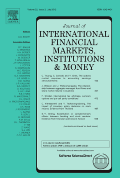
Journal of International Financial Markets Institutions & Money
Exploring the Nexus of Finance and InstitutionsThe Journal of International Financial Markets, Institutions & Money, published by Elsevier, serves as a leading platform for the dissemination of high-quality research in the fields of finance, economics, and econometrics. With an impressive impact factor reflected in its status as a Q1 journal in both categories for 2023, it ranks among the top journals, positioned at #47 out of 317 in Finance and #111 out of 716 in Economics. This journal offers a unique focus on the interplay between financial markets and institutions on a global scale, making it an essential resource for scholars, practitioners, and students alike. The journal welcomes innovative theoretical, empirical, and applied research, contributing to an exciting dialogue that shapes the future of international finance. For researchers looking to publish their findings, this journal is committed to rigorously engaging with contemporary financial phenomena, positioning itself as a vital cornerstone of academic and professional discourse.

European Journal of Finance
Advancing financial knowledge across Europe.European Journal of Finance is a prestigious publication specializing in the domains of finance, economics, and econometrics, published by Routledge Journals, Taylor & Francis Ltd. Established in 1995, this journal has become a vital resource for researchers, practitioners, and students, contributing significantly to the understanding of financial systems and markets. With its Q1 ranking in the Economics, Econometrics and Finance category, it stands out for its rigorous peer-reviewed articles that explore innovative theories, models, and empirical studies. The journal's impressive Scopus ranking of 35 out of 242 highlights its impact and relevance within the field, with an 85th percentile standing that underscores its importance to current financial research. Although it does not offer open access, the European Journal of Finance remains a cornerstone for those seeking to delve deeper into the complexities of finance, equipped with insights that drive both academic inquiry and practical application.
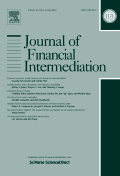
JOURNAL OF FINANCIAL INTERMEDIATION
Advancing insights in financial intermediation.JOURNAL OF FINANCIAL INTERMEDIATION, published by Academic Press Inc Elsevier Science, is a premier academic journal dedicated to the study of financial intermediation. First established in 1990, this esteemed journal has firmly positioned itself within the top quartile (Q1) of rankings in both Economics and Econometrics as well as Finance, reflecting its significant impact and relevance in the field. With an impressive Scopus ranking of #31 out of 317 in Finance and #74 out of 716 in Economics and Econometrics, it caters to a diverse audience, including researchers, professionals, and students interested in the intricate dynamics of financial markets and institutions. While the journal does not currently offer open access, it remains a vital resource for disseminating cutting-edge research and insights that drive innovation and inform policy-making in the financial sector. With a commitment to maintaining high academic standards, the JOURNAL OF FINANCIAL INTERMEDIATION continues to serve as an essential platform for advancing knowledge in financial theories and practices.
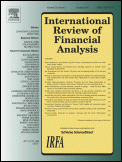
International Review of Financial Analysis
Transforming financial analysis through scholarly excellence.The International Review of Financial Analysis, published by Elsevier Science Inc, is a premier journal dedicated to advancing the fields of finance and economics. With an impressive impact factor and ranked in the top quartile (Q1) of both Economics and Econometrics and Finance categories, this journal is recognized for its high-quality research and significant contributions to the discipline. Since its inception in 1992, it has provided a platform for scholars to present innovative theories and empirical studies that address critical financial issues around the globe, making it a vital resource for researchers, professionals, and students alike. Although it does not offer open access, the journal actively engages with contemporary debates in financial analysis, ultimately empowering its readership to contribute to and benefit from the ongoing discourse. With its convergence of financial research and analytical methodologies through 2024, the International Review of Financial Analysis remains a cornerstone in the pursuit of knowledge within the ever-evolving landscape of finance.
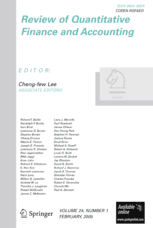
Review of Quantitative Finance and Accounting
Exploring the Intersection of Finance and AccountingThe Review of Quantitative Finance and Accounting, published by Springer, is a distinguished academic journal that has been at the forefront of scholarly discourse since its inception in 1991. With an ISSN of 0924-865X and an E-ISSN of 1573-7179, this journal specializes in the interdisciplinary realms of accounting and finance, particularly emphasizing quantitative methodologies and their applications in real-world scenarios. With an impressive track record reflected in its 2023 rankings, it sits in the Q2 category across key fields such as Accounting, Business Management, and Finance, demonstrating its relevance and influence within these domains. Although it operates without an Open Access option, the journal's content remains vital for researchers, professionals, and students aiming to deepen their understanding of quantitative approaches in finance and accounting contexts. The Review of Quantitative Finance and Accounting stands as an essential resource for advancing knowledge and fostering innovation within these critical disciplines.
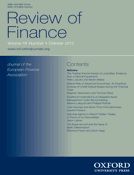
Review of Finance
Elevating academic discourse in finance and economics.The Review of Finance, published by Oxford University Press, stands as a premier academic journal in the fields of Finance, Accounting, and Economics. With an ISSN of 1572-3097 and an impressive track record stretching from 2001 to 2024, this journal is consistently recognized for its high-quality research, reflected in its Q1 rankings across key categories, including Accounting, Finance, and Economics and Econometrics. The Review of Finance is dedicated to advancing the understanding of financial phenomena through robust empirical and theoretical insights, making it an essential resource for researchers and professionals alike. Additionally, its strong Scopus rankings, placing it in the top percentiles, highlight its influence and relevance in ongoing academic discourse. Although the journal is not open access, it remains widely accessible through academic institutions, ensuring that its valuable contributions reach an extensive audience. The editorial board invites submissions that promise to further engage the academic community in the dynamic intersections of finance, accounting, and economic research.
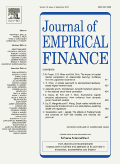
Journal of Empirical Finance
Empowering finance through rigorous empirical research.Journal of Empirical Finance, published by Elsevier, stands as a key resource in the areas of finance and economics, with a definitive focus on empirical studies. As a prominent journal since its inception in 1993, it has made significant strides in contributing to the academic community, evidenced by its soaring categorization in Q1 for Finance and Q2 for Economics and Econometrics as of 2023. With an ISSN of 0927-5398 and an E-ISSN of 1879-1727, the journal emphasizes robust, data-driven analysis to inform both theoretical and practical aspects of financial research. While access options do not include open access, the journal ensures that its content remains accessible to a diverse audience of researchers, professionals, and students. It fosters a platform for innovative research and discourse, significantly impacting the fields of finance, economics, and econometrics. The Scopus rankings further bolster its reputation, placing it in the 61st percentile in both categories, reflecting a commitment to high-quality research output. As the journal continues to evolve, it invites contributions that push the boundaries of empirical finance, enabling a deeper understanding of financial mechanisms that drive global economies.

International Journal of Financial Studies
Exploring the forefront of financial innovation.The International Journal of Financial Studies is a premier publication dedicated to advancing the field of finance through open-access research. Published by MDPI based in Switzerland, this journal offers researchers, professionals, and students a platform to disseminate their findings in an accessible format since its establishment in 2013. With its ISSN of 2227-7072 and a commendable impact reflected in its Q2 ranking in finance, it occupies an influential position among finance-related journals, as evidenced by its 65th percentile rank in Scopus. The journal encompasses a wide array of topics in finance, making it essential reading for those seeking to stay abreast of current research trends and methodologies. As an open-access journal, all articles are freely available, significantly enhancing the visibility and reach of published studies, which is crucial for fostering collaboration and innovation within the global financial community. Published continuously until 2024, the International Journal of Financial Studies is not just a source of knowledge; it is a critical contributor to the progression of financial scholarship.
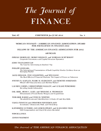
JOURNAL OF FINANCE
Elevating understanding in finance and economics.JOURNAL OF FINANCE, published by Wiley, stands as a premier academic journal in the fields of finance, economics, and accounting. With a history dating back to 1946, the journal has consistently delivered impactful research that shapes financial theory and practice, boasting an impressive impact factor reflective of its high citation rate. Its Quartile 1 ranking in Accounting, Economics and Econometrics, and Finance illustrates its leading position within these disciplines. Although not an open access publication, the journal continues to be indispensable for researchers, professionals, and students seeking to advance their understanding and knowledge through rigorous empirical analysis and comprehensive reviews. With an esteemed global readership, the JOURNAL OF FINANCE remains committed to fostering the dissemination of innovative financial research well into 2024 and beyond.
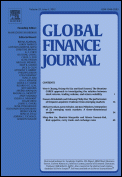
Global Finance Journal
Uncovering insights that shape financial landscapes.Global Finance Journal is an esteemed periodical published by Elsevier, dedicated to the dynamic fields of finance and economics. With an impressive history spanning from 1989 to 2024, this journal holds a significant position in the academic community, boasting a Q1 quartile ranking in both Economics and Econometrics, as well as Finance, as of 2023. It is highly regarded in Scopus rankings, placing 40th out of 317 in Finance and 99th out of 716 in Economics and Econometrics, demonstrating its influence and reach among researchers and practitioners alike. Although not an open-access journal, the Global Finance Journal provides rigorous peer-reviewed articles that explore critical issues, advance theoretical frameworks, and address practical applications in global finance. As such, it serves as a vital resource for researchers, financial professionals, and students aiming to deepen their understanding of economic phenomena and contribute to the ongoing discourse in these vibrant disciplines.